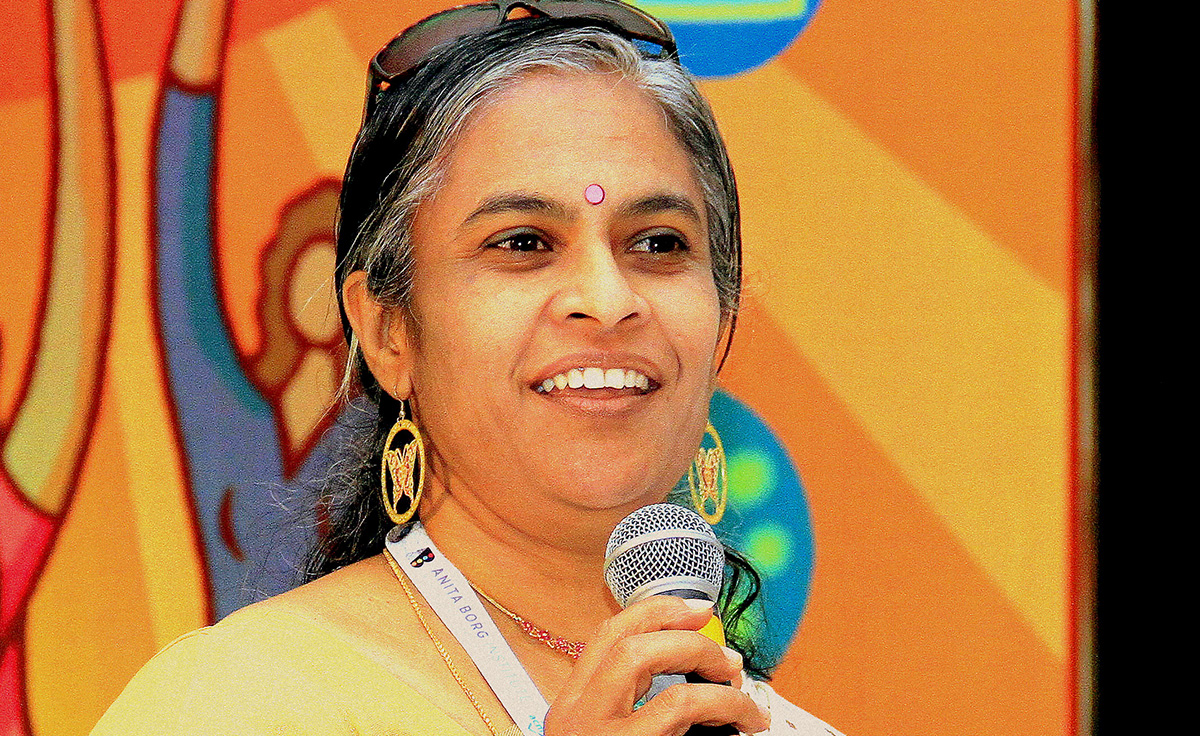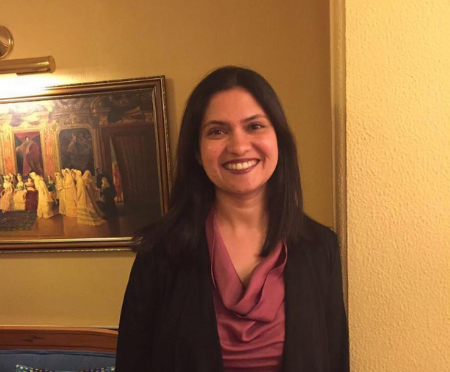I’m Geetha Kannan, Managing Director of AnitaB.org India, and this is how I Lead from Within
Geetha Kannan was never a techie. Nor was she from a Human Resources background. And yet, she worked 16 years with Infosys and is today among the most respected voices in the country in the field of diversity and inclusion. How is that? Through constant learning, which Kannan considers her superpower. Managing Director of AnitaB.org India, Kannan’s arguments are simple, straightforward and embody clarity (of thought) – much like her upbringing. This is her story and how she leads from within…
My Early Years
While my primary schooling was in the U.S., I grew up in the Nilgiris District, Tamil Nadu, where my parents decided to settle after returning to India. Back then, Nilgiris was not as polluted and populated as it is today; it was extremely beautiful and pristine. My family and I would go on a holiday only to look forward to coming back because where we lived was more picturesque than any place we’d visit. I wanted to live and die in the Nilgiris. Around the time I was to enroll in college, one of my mother’s cousins who had a law firm urged me persistently to study law and take over his business. He viewed me as somebody smart enough to take over what he had built over years. As I began to understand and recognise this, it sparked the thought that I could probably do more than what my small village in the Nilgiris could offer. Ironically, I barely strayed a few hills down to Coimbatore to complete my MBA. But I landed my first job in Mumbai with Raymond Woollen Mills Ltd. Moving to Mumbai from the Nilgiris was a defining moment for me – one that blew my mind. Every moment in Mumbai taught me something. If I was to plot my learning there, it would be a steep curve that’s almost a straight line shooting upwards.
On Asking For What You Want
I was staying in a working women’s hostel in Mumbai, where rooms and bathrooms had to be shared. Having grown up in a British bungalow in the Nilgiris where bedrooms have attached dressing rooms and independent bathrooms, living in a shared space was very hard. It sounds silly now but back then, my situation seemed extremely distressing. So I went to the director of Raymond Woollen Mills, where I was a management trainee, and told him that I cannot continue my training because I cannot live like this. I expressed that I need a house where my parents can visit me but I can’t afford one in Mumbai so I would like to go back. He asked if that was the only reason why I wanted to return home. When I confirmed, he immediately called someone to ask when the next apartment is available for allotment.
Apparently, all managers were allotted apartments. But I was the first and only management trainee to be allotted one. I remember thinking that it was so simple; I just had to ask. For the director, the solution was immediate and easy. But because nobody asked him he never thought of allotting a management trainee a house. Me asking, in fact, started a trend where the company would ask management trainees if they needed accommodation during their stay in Mumbai.
This is one of the defining lessons that I’ve learnt: ask for what you want. Of course, people can say no but that is the worst that could happen. Either ways you will not be worse off than before you asked.
On The Golden Years
I joined Infosys in its formative years in 1993, when it was growing rapidly. There were about 250-300 employees when I joined as opposed to thousands who work with Infosys now. Everyone’s voice was important to the founders; we were all heard and there was no discrimination.
I was fortunate enough to get varied roles in the organisation. When I felt that there was an opportunity that I would like to explore, I asked, I worked hard towards it, I presented my ideas and often, I received what I wanted. I was offered strategic projects and positions simply because I asked. I worked with Infosys for 16 years and, looking back, I think I really grew with the company.
On Diversity and Inclusion
We had set up a gender diversity network in Infosys called IWIN (Infosys Women Inclusivity Network), which I was heading for a while. After a point, I took up diversity itself as one of my strategic projects and put my energies into championing that cause.
One day a colleague came up to me to point out that while these efforts were all great for gender diversity, had we looked at things holistically and thought of what happens to the LGBT community? This colleague’s partner was in Canada and because they were in a same-sex relationship and unmarried (or both), his partner could not be covered under the insurance policies provided by the organisation to its employees. That was an eye-opener for me. There is so much that we don’t know and there are so many people suffering as a result of our lack of awareness.
This realisation made me delve further into this cause. I worked closely with NASSCOM and a few other such organizations to set up diversity forums in India in an effort to aim for equality for all and remove all the biases that come as a result of society.
On Learning
I remember once we were doing a study of culture at Infosys and I was making the presentation when a board member walked up to me and asked if I had majored in anthropology or culture studies. He was so convinced with the way I spoke and all that I knew about the culture at Infosys that he thought I had a background in the same field. But I didn’t. It was all through informal learning. It is the best way for you to grasp, formulate and execute relevant strategies.
I worked very closely with the founders of Infosys and so I’ve learnt a lot from them. The way Narayana Murthy thinks, Nandan Nilekani handles clients and NS Raghavan would personally interview almost every engineer who we hired, to ensure culture compatibility. From NS Raghavan I’ve learnt how to interview and how to assess if a person is a culture fit for the organisation. Nandan’s knowledge and ability to see perspectives that none of us can see are amazing. And Murthy can carry the world on his shoulders! Each leader, in my eyes, is someone I can learn something from.
Learning is my key strength and as a result, today, I can put my hand on anything and turn it successful.
On Meditation
I learnt how to meditate when I was six or seven. At the core of my being I’m very calm and I believe in a higher order, because of which overcoming fear has been somewhat easier for me.
But meditating is not just important to conquer fear. A lot of our unconscious biases and what we do in a situation is because we are unaware of the why – why are we doing this or that, why do we have a certain bias etc. This causes the greatest hurt at an organisational level. With meditation you can start becoming aware and more conscious of your thoughts and actions.
Values I Stand By
I respect the individual. It comes through in every interaction and transaction. I believe that at the core of every human being there is only goodness, so I trust a lot and respect every individual for who they are.
I believe in giving back to the society. I’ve been taught this since childhood. As a family, we’d set aside certain produce from our farm which would only go to the poor. And we’d set aside something else to offer in the temple. It’s very important for me that if I have 100, I can give away 50 to those who need it more than me.
My Work At AnitaB.Org
Through our work with students, corporate professionals and women entrepreneurs, we are making inroads and creating an impact on the way society thinks. It’s not enough for us to change an organisation or an individual in an organisation, we have to have a wide-ranging impact on society and for me, it’s very exciting to be in this position where I can do something about it.


